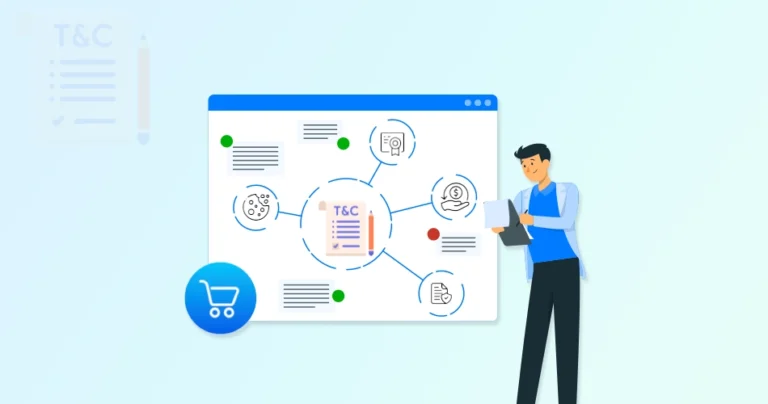When you think of an eCommerce website, what pages come to mind? Home page, product pages, category pages, contact us, etc., right? Maybe even high-quality landing pages. But often, one of the pages overlooked by many is the “Terms & Conditions” page.
While it might not be the flashiest part of your online store, this legal document is absolutely critical. An eCommerce Terms and Condition agreement page establishes the rules of engagement between your business and your customers. That covers everything from shipping and returns to IP and dispute resolution.
This blog will give you an idea on how the eCommerce experts create the Terms & Conditions page and what kind of info they recommend you include. Let’s begin.
What is a Terms & Conditions Agreement?
Terms & Conditions agreement, also known as Terms of Service or Terms of Use, is a legally binding contract between a website or service provider and its users. It outlines the rules and regulations that users must agree to abide by when accessing or using the platform.
Think of it as the fine print, but instead of being buried, it should be clearly presented and accessible. In the context of eCommerce, it also addresses specific aspects like purchase terms, shipping and returns, payment processing, and data privacy.
Essentially, the Terms & Conditions agreement is meant to protect both the business and its customers and ensure a clear understanding of their respective rights and obligations.
To design the best T&C page, you may hire our dedicated eCommerce development company. We will go through your business model and create the page accordingly. The elements to be added will be decided accordingly. But which are the key ones?
As an experienced eCommerce website development company, we not only design visually appealing websites but also create essential legal pages like Terms & Conditions tailored to your business model.
Key Elements of an eCommerce Terms and Conditions Page
A comprehensive eCommerce T&C page should address several key areas to protect your business and establish clear expectations with your customers. Here’s a breakdown of the essential elements.
User Agreement
The User Agreement section of your T&C establishes the contractual relationship between your eCommerce business and its customers.
It’s where you formally declare that by accessing or using your website and services, the customer agrees to be bound by the rules and conditions you’ve outlined.
It should cover Definition of Parties, Acceptance of Terms, Scope of Agreement, Modification Clause, etc.
Acceptable Use
The Acceptable Use section of your Terms and Conditions outlines what users are permitted and, more importantly, not permitted to do when using your website or services.
It’s crucial for protecting your business from misuse, maintaining a safe online environment, and setting clear expectations for user behavior. This section acts as a digital rulebook, defining the boundaries of acceptable interaction.
You will need to include the lawful use, account responsibility, and consequences of violation. Also, the prohibited activities like IP infringement, spamming and unsolicited communications, harassment and abuse, misrepresentation, etc.
Pricing & Payment
The Pricing & Payment section of your eCommerce T&C is crucial for building trust with your customers and ensuring smooth transactions. Clear and transparent pricing policies are essential for avoiding disputes and fostering a positive buying experience.
This section should comprehensively cover all aspects of pricing and payment, leaving no room for ambiguity. Some things to include are pricing display, currency, taxes, payment methods, payment processing, pricing errors, order confirmation, payment authorization, and disputes.
Shipping & Delivery
The Shipping & Delivery section of your eCommerce Terms and Conditions is crucial for setting customer expectations and managing the logistics of eCommerce fulfillment. Clear communication about shipping policies, costs, and timelines is essential for a smooth and positive customer experience.
This section should provide comprehensive information about how you handle shipping and delivery, minimizing potential confusion or frustration.
Returns & Refunds
The Returns & Refunds section of your eCommerce T&C is vital for building customer trust and managing expectations regarding product returns. A clear and concise eCommerce return policy can significantly impact customer satisfaction and reduce potential disputes.
This section should outline the conditions under which returns are accepted, the refund process, and any associated fees or restrictions.
Intellectual Property
The Intellectual Property section of your eCommerce Terms and Conditions is crucial for protecting your brand, content, and other creative assets. It establishes your ownership of the materials on your website and sets clear boundaries for how users can and cannot use those materials.
This section is essential for preventing copyright infringement, trademark violations, and other forms of intellectual property theft.
Some things to cover through this section are copyright, trademarks, logo and branding, prohibited use, etc.
Privacy Policy
The Privacy Policy section of your eCommerce T&C, or ideally as a standalone document linked prominently, is not just a legal requirement in many jurisdictions; it’s a cornerstone of building trust with your customers.
It details how you collect, use, and protect the personal data of your users. Transparency and clarity in your Privacy Policy are essential for demonstrating your commitment to data privacy and complying with relevant regulations like GDPR, CCPA, and others.
Disclaimer of Liability
The Disclaimer of Liability section of your eCommerce Terms and Conditions is a crucial risk management tool. It aims to limit your business’s liability for certain situations, protecting you from excessive claims and lawsuits.
While it doesn’t provide a blanket exemption from all liability, it helps define the scope of your responsibility and allocate risk appropriately. This section is complex and requires careful drafting to be effective.
Age Restrictions (if applicable)
The Age Restrictions section of your eCommerce T&C is crucial if you sell age-restricted products or services. Like alcohol, tobacco, adult content, or anything else that has legal age limitations.
This section clearly states the minimum age required to use your website or purchase your products, helping you comply with relevant laws and protect minors. It’s not just a suggestion; it’s a legal necessity in many cases.
Governing Law
The Governing Law section of your eCommerce T&C specifies which jurisdiction’s laws will govern the interpretation and enforcement of your agreement. This is a crucial clause because it determines where legal disputes will be resolved and which legal framework will be applied.
Choosing the right governing law is essential for protecting your business interests and minimizing legal risks.
Dispute Resolution
The Dispute Resolution section of your eCommerce Terms and Conditions outlines the process for resolving disagreements between your business and your customers. A well-drafted dispute resolution clause can save time and money by providing a clear and efficient mechanism for handling disputes outside of traditional litigation.
It can also help maintain positive customer relationships by offering a less adversarial approach.
Changes to Terms
The Changes to Terms section of your eCommerce T&C addresses how and when you can modify your agreement. It’s a crucial clause because it allows you to adapt your terms to changing business needs, legal requirements, or market conditions without having to renegotiate the entire agreement with each user.
However, it’s also important to balance your flexibility with fairness to your customers by providing adequate notice of changes.
Contact Information
The Contact Information section of your eCommerce Terms and Conditions, or ideally as a standalone “Contact Us” page linked prominently, provides a way for customers to reach you with questions, concerns, or feedback.
It’s a crucial element for building trust and demonstrating your commitment to customer service. Making it easy for customers to contact you is essential for a positive customer experience.
If you are creating an eCommerce marketplace, this agreement will cover three parties: The site administrator (like Amazon), the vendors or sellers, and the customers.
You may get our eCommerce consulting services to understand the specifics and include the necessities in your T&C page.
If you’re looking to implement a fully customized Terms & Conditions page along with other vital store elements, you can hire dedicated Ecommerce developers from our team for a complete setup.
Importance of Having Clear eCommerce Terms and Conditions
Having clear and comprehensive eCommerce Terms and Conditions is absolutely vital for any online business. Beyond just being a legal formality, the T&C agreement is the foundational element for building trust, managing risk, and ensuring smooth operations.
For the Business
- Legal Protection: Terms and Conditions act as a legally binding contract, protecting your business from potential liabilities and frivolous lawsuits. They define the rules of engagement and limit your responsibility for certain situations.
- Protection of Intellectual Property: They safeguard your valuable content, trademarks, and other intellectual property from unauthorized use or infringement.
- Reduced Disputes: Clearly defined terms and conditions help prevent misunderstandings and disputes with customers by setting clear expectations from the outset.
- Professionalism and Credibility: Having well-drafted terms and conditions demonstrates professionalism and builds trust with customers, enhancing your brand reputation.
- Control and Flexibility: They give you control over how your website and services are used, allowing you to set rules for acceptable behavior and protect your business interests.
- Efficient Dispute Resolution: They can outline a process for resolving disputes outside of court, saving time and money on legal fees.
- Compliance with Laws: They help you comply with various legal requirements, such as data privacy regulations and consumer protection laws.
For the Customers
- Transparency and Trust: Clear terms and conditions build trust by being transparent about your policies and procedures. Customers feel more confident when they know what to expect.
- Clarity and Understanding: They provide clarity on important aspects like shipping, returns, refunds, and payment processing, reducing confusion and frustration.
- Protection of Rights: They inform customers about their rights and responsibilities, empowering them to make informed decisions.
- Easy Access to Information: Having easily accessible terms and conditions demonstrates respect for customers and makes it easy for them to find important information.
- Positive Customer Experience: By setting clear expectations and providing a transparent framework, they contribute to a positive and hassle-free customer experience.
In short, investing the time and resources to create comprehensive and legally sound eCommerce Terms and Conditions is beyond crucial. The benefits far outweigh the costs, providing a solid foundation for your online operations and contributing to long-term success.
Let’s Summarize the eCommerce T&C
eCommerce Terms and Conditions might seem like a dry, legalistic necessity, but it’s really a foundation of trust with your customers. Clear, concise, and accessible terms foster a positive buying experience, minimize misunderstandings, and ultimately contribute to a thriving online store.
Make sure to cover the key elements of T&C are user agreement, acceptable use, payment, shipping, returns and refunds, IP, privacy, age restrictions, etc.
While you can check out other websites’ T&Cs, make sure to create yours with careful consideration and consultation with legal counsel. If you need help with that, let’s connect today!
FAQs on eCommerce Terms & Conditions
Q1. Can I just copy Terms and Conditions from another website?
Absolutely not! Terms and Conditions should be tailored to your specific business, products, and services. Copying someone else’s terms can leave you exposed to legal risks and may not even be relevant to your business.
Q2. How often should I update my Terms and Conditions?
You should review and update your Terms and Conditions periodically, at least annually, or whenever there are significant changes to your business practices, products/services, or legal requirements.
Q3. Where should I display my Terms and Conditions?
Your Terms and Conditions should be easily accessible from every page of your website, typically in the footer. It’s also a good idea to link to them during the checkout process and require customers to agree to them before completing a purchase.





